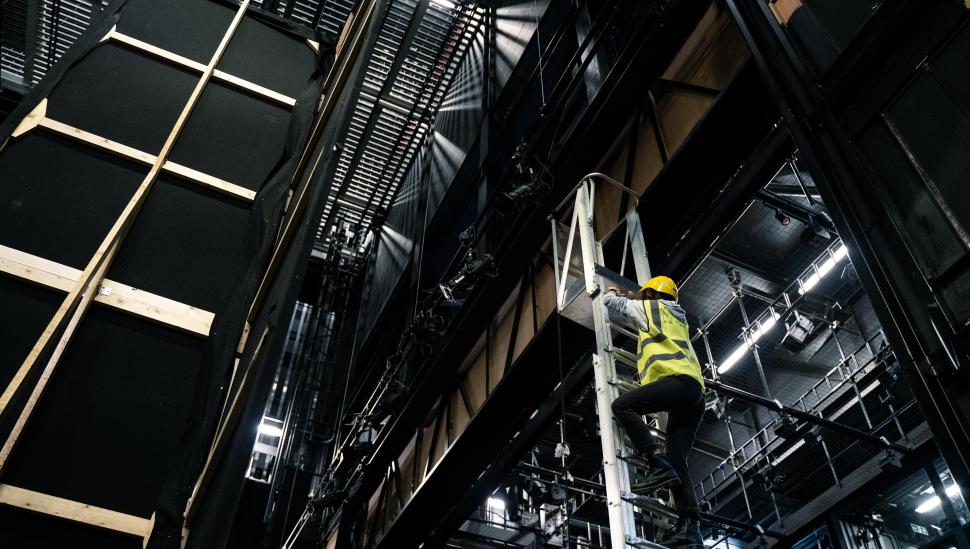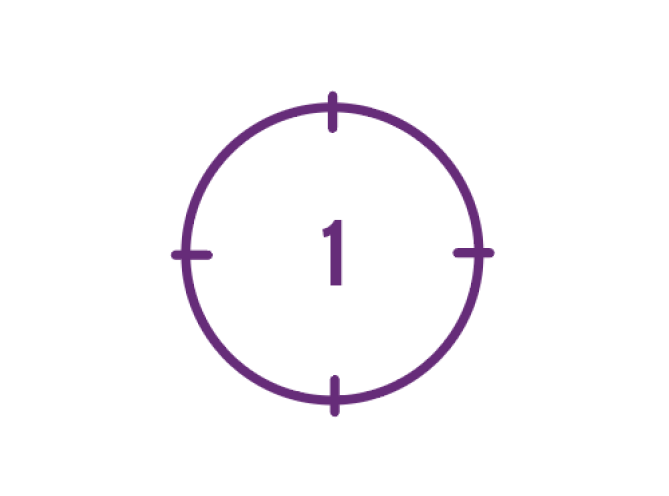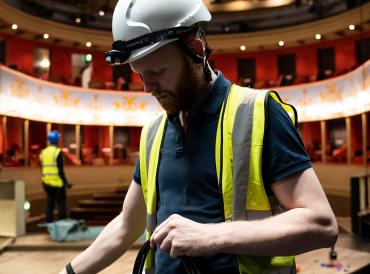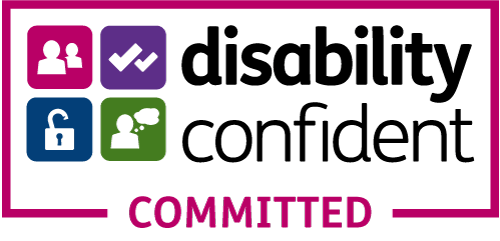BA (Hons) Production & Technical Arts Top-Up


One year top-up degree
This is a one-year full-time course, starting in September 2024.
The course is designed for students holding our Foundation Degree (FdA), or one from an equivalent provider.

Highlights
Deepen your existing experience with specialist roles in Lighting, Sound, Stage Management, Production Management, Set Construction or Screen.
Undertake senior production roles on three public-facing productions or screen projects, carry out a substantial professional placement, and undertake an independent industry project on a subject you choose.

Is this course for me?
Minimum age: 18
This course requires a Foundation Degree upon entry, graded merit or higher in relevant subject, or equivalent professional experience.
Overview
Tuition fees
Fees are reviewed annually.
2024/25 entry:
UK applicants: £9,000 per year
International applicants: £24,155 per year
Application fee
£27.50 UCAS fee (for 6 choices). There isn't an application fee for Production & Technical Arts courses.
Application deadline
1 July 2024
Interviews
Interviews will be held from November 2023. We encourage early applications.
Apply now for 2024/25 entry
About the course
During this one-year technical arts course, you’ll undertake three production roles, which you will have selected, on one of our productions or short films.
With our support, you’ll undertake a significant work placement project where you’ll develop further professional practice and make vital connections within the industry.
The third requirement is an independent project, where with our help, you will choose, define, research and produce a 4000 word project of your own.
Key Information & FAQs
You’ll have to be dedicated and determined to succeed and demonstrate how you can apply your passion for your chosen career in production and technical arts. You’ll also need to be able to work under your own initiative and collaboratively, and have the creative spark to bring a new way of thinking to your chosen field in production and technical arts.
This production course is designed to build on your existing experience and knowledge. On this course, you'll choose from among the following specialisms:
- Lighting
- Sound
- Stage Management
- Production Management
- Scenic Construction
- Screen & Audio
The equipment list is reviewed annually and is subject to change for the next academic year. Ahead of beginning your course, you will receive more information about the equipment required.
Lockers, deposits and money
You will be allocated a locker for your time at LAMDA, to keep your valuables safe.
A fee of £55.00 is required to cover various items that you will require during your training. Please bring the £55 with you on the first morning.
- £20 of this is a deposit for your swipe card and keys
- £5 of this money will cover the purchase of a USB Memory stick required in your training.
- £30 is to pay for your Personal Protection Equipment (PPE) which consists of a hard hat, hi-vis vest, earplugs, safety goggles and dust mask.
Assuming no loss or breakages, then £20 will be returned to when you leave the course. The USB Stick and PPE remain your property.
Equipment required
Work clothes while working in a production role on shows
- You will be required to wear 'Show Blacks' when working on productions.
- Tops must have long sleeves and be long enough to not reveal any skin when bending over.
- Trousers should not be faded, or ripped, but could be jeans, cargo trousers or similar.
- Black leggings are not appropriate, nor are v-neck tops.
- You will also require black shoes/trainers.
For set construction, painting, fit ups, get outs etc
- You must provide overalls or old clothes.
- Avoid clothing that is too loose and if you have long hair provide the means to tie it back.
Appropriate footwear
- Appropriate footwear must be worn during production periods and when working in hazardous environments for your own safety e.g. Workshop or onstage when building/striking.
- Ensure that you have a pair of black safety boots with a steel or composite toe-cap. It is vital to have good ankle support when selecting your steel toe-capped shoes, so boots are preferable.
- Details of other Personal Protective Clothing and equipment will be provided as required.
Tools and equipment
A tool and equipment list is provided below.
You must have all the items listed by the time you come to LAMDA. The kit list can seem quite daunting at first glance. Break it down, and start getting all the required items once you have accepted your offer from LAMDA.
These items represent only the basic ‘starter’ kit. A lot of students quickly discover that the basic list is very limiting, and many start to purchase a whole range of additional items in order to supplement the things we request; Leatherman multi-tools, cordless drills, laptop/computers etc.
The list below is a basic tool kit. If you wish to expand it further recommendations can be made. Please remember that your tools will be used intensively, therefore cheap tools can be a false economy. However, many shops offer reasonably priced starter toolkits that will contain many of the items listed, and represent excellent value if you are working to a tight budget.
Given that so many of you will be starting with identical kit, it is vital that you uniquely mark/label everything that belongs to you, either by etching, painting, colour coding with tape.
Stationary List
Stationary Equipment
Essential
- Wristwatch (Analogue, digital or smart)
- LED Torch/Flashlight
- Metric scale ruler (with 1:25, 1:50 & 1:100 scales)
- Large lever arch folder for A4 paper.
Recommended
- 2 pairs of scissors (one for tough fabric and one for general purpose)
- Selection of pens and pencils (to include HB)
- Sharpies
- Highlighters
- Post-It Notes
Important note
On your first day you'll be required to show your tutors your toolkits in one of your classes. We will want to see your toolkits, work boots and any other equipment.
If you are struggling to obtain everything on the list – don’t panic! We will help you prioritise what to get next, when you arrive. Please note that LAMDA's insurance does not cover students' personal belongings, please source your own insurance for personal belongings.
You will need to have a Merit at Foundation Degree level in a relevant subject, or be able to demonstrate equivalent learning in a professional environment.
You need to be a fluent English speaker. Non-native speakers do not need to provide an English language test report when they apply as we assess English at the interviews. However, you’ll need to provide a valid IELTS test report with an overall score of seven if you’re offered a place. We can only accept IELTS for UKVI.
Credits: 120 Credits in total
Specialist Production Role 1 (25 credits)
Specialist Production Role 2 (25 credits)
Specialist Production Role 3 (25 credits)
Professional placement (30 credits)
Independent Industry Project (15 credits)
Tuition fees:
Fees are reviewed annually.
2024/25 entry:
UK applicants: £9,000 per year
International applicants: £24,155 per year
Course fees confirmed in an offer letter may be increased in further years of study by an inflationary amount determined in accordance with measures set by government.
Application fee
£27.50 UCAS fee (for 6 choices). There is no additional application fee for Production & Technical Arts courses.
You’ll be assessed continuously throughout all your classes and projects. There will also be a summative (final) assessment which takes place at the end of each module.
Once you've completed the course you will:
- Be equipped with all the necessary skills and experience for a rewarding career at the relevant technical level in the entertainment industry
- Gain a thorough knowledge of the performing arts industry and feel comfortable working as part of a professional theatre company or film production team
- Be able to apply research and presentation skills successfully in order to enhance your professional practice
An outline timetable will be shared with you before you course starts, so that you can start planning your time. There are three terms per year, starting in September, January and April.
This course normally has an intake of around ten. Most tuition will take place in small groups, so you’ll be working closely with the teacher , but you’ll also have plenty of time to get personalised one-on-one training and some sessions will involve the whole group.
Your work placement may be a useful opportunity for gaining professional experience in the area of your choice. And you’ll have other opportunities to network with current industry practitioners (this may be online, onsite or a combination of the two), and we will ensure you’re prepared both for interviews with employers and self-employment.
You’ll also have access to the Genesis LAMDA Network when you graduate which provides mentoring and a bridge into the industry, as well as our LAMDA Connect platform, find out more about support beyond LAMDA here.
Further Resources
Find out more information about the application process, training at LAMDA and funding on our website. If you need any help, contact our friendly Admissions team.





